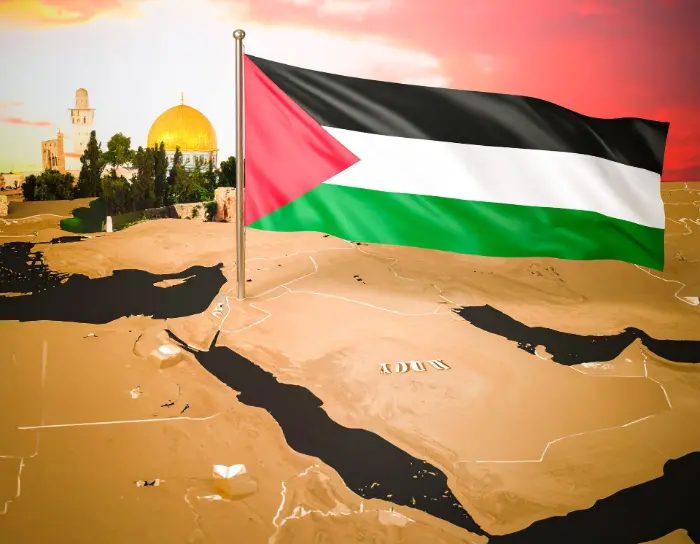Palestine: A Complex History and the Ongoing Crisis
🔹 Introduction
The conflict over Palestine remains one of the most intractable and emotionally charged issues in global geopolitics. What began as a territorial dispute has grown into a prolonged struggle involving religion, national identity, international law, and the human rights of millions. This article explores the roots, evolution, and current status of the Palestinian issue, examining why peace remains elusive after more than a century of conflict.

🔸 Ancient Palestine: A Shared Homeland
Palestine is an ancient land located in the Eastern Mediterranean region. It holds immense religious significance for Jews, Christians, and Muslims alike.
- By 3000 BCE, it was home to the Canaanites, followed by the Israelite Kingdoms (Judah and Israel).
- Throughout history, it came under the control of the Romans, Byzantines, Islamic Caliphates, and eventually the Ottoman Empire, which ruled the area from 1517 to 1917.
- Jerusalem, in particular, became a holy city for all three Abrahamic religions.
🔸 British Mandate and the Balfour Declaration
- After World War I, the League of Nations granted Britain the mandate to govern Palestine (1920–1948).
- In 1917, Britain issued the Balfour Declaration, supporting "the establishment in Palestine of a national home for the Jewish people" while vaguely promising not to harm the rights of existing non-Jewish communities.
- Jewish immigration to Palestine increased significantly, causing tensions with the Arab population who feared displacement.
🔸 The UN Partition Plan and the Creation of Israel
- In 1947, the United Nations proposed a partition plan to divide Palestine into two states: one Jewish and one Arab, with Jerusalem under international administration.
- Jews accepted the plan; Palestinians and Arab nations rejected it, seeing it as unfair.
- On May 14, 1948, the State of Israel was declared.
- The next day, five Arab countries invaded Israel, resulting in the 1948 Arab-Israeli War.
🔸 The Nakba: The Palestinian Catastrophe
- During the 1948 war, more than 750,000 Palestinians were expelled or fled from their homes.
- Over 400 Palestinian villages were destroyed or abandoned.
- Palestinians call this event the Nakba, meaning “catastrophe.”
- These refugees and their descendants remain stateless, living in refugee camps across the Middle East.
🔸 1967: The Six-Day War and Occupation
- In June 1967, Israel fought a war against Egypt, Syria, and Jordan.
- Israel captured the West Bank, East Jerusalem, Gaza Strip, Golan Heights, and Sinai Peninsula.
- Though Sinai was later returned to Egypt, the rest remain under varying levels of Israeli control.
- The UN Security Council adopted Resolution 242, calling for Israel to withdraw from occupied territories — a cornerstone of future peace talks.
🔸 Palestinian Resistance and the Rise of the PLO & Hamas
- In 1964, the Palestine Liberation Organization (PLO) was founded, calling for armed struggle to reclaim Palestine.
- In 1987, the First Intifada (uprising) erupted in the West Bank and Gaza.
- Hamas, an Islamist political and militant group, was also founded in 1987 and later gained control of Gaza after winning elections in 2006.
- The PLO later recognized Israel and renounced violence, leading to peace talks in the 1990s.
🔸 The Oslo Accords and the Peace Process
- In 1993, the Oslo Accords marked the first face-to-face agreement between Israel and the PLO.
- It created the Palestinian Authority (PA) to govern parts of the West Bank and Gaza.
-
However, key issues were left unresolved:
- Borders
- Refugees’ right of return
- Status of Jerusalem
- Israeli settlements
- The Second Intifada (2000–2005) and mutual distrust derailed the peace process.
🔸 Settlements, Separation Barrier & International Law
- Israel has built over 250 settlements in the West Bank and East Jerusalem.
- Most of the international community considers them illegal under international law, specifically the Fourth Geneva Convention.
- Israel also built a separation barrier, which it calls a security measure. Palestinians view it as a land grab.
- The International Court of Justice (ICJ) ruled in 2004 that the barrier is illegal under international law.
🔸 The Gaza Blockade and Recurrent Wars
- Since 2007, Israel and Egypt have imposed a blockade on Gaza after Hamas took control.
- Gaza has faced multiple Israeli military operations (2008, 2012, 2014, 2021, and 2023) after rocket attacks from Hamas and other militant groups.
- These wars have caused massive civilian casualties and widespread destruction in Gaza, deepening humanitarian crises.
🔸 Status of Jerusalem: A Core Dispute
- Israel claims Jerusalem as its undivided capital.
- Palestinians see East Jerusalem as the capital of their future state.
- The international community, including the UN, has largely not recognized Israel’s annexation of East Jerusalem.
🔸 Recent Developments (2023–2025)
- 2023–2024: Major escalations in Gaza, with thousands of civilians killed, including women and children.
- Israel intensified its military campaigns, leading to international condemnation and calls for ceasefire.
- The United Nations, Red Cross, and WHO warned of famine, medical collapse, and mass displacement in Gaza.
- The International Criminal Court (ICC) is investigating alleged war crimes by both Israeli forces and Palestinian militants.
- Political divisions between Hamas (Gaza) and Fatah (West Bank) continue to hinder a unified Palestinian response.
🔸 International Response and the Road Ahead
- The UN supports a Two-State Solution based on the 1967 borders.
- The US, EU, and Arab League have all attempted to mediate peace, with limited success.
- Normalisation deals like the Abraham Accords between Israel and Arab states have shifted regional dynamics.
- But without a just solution for Palestinians, analysts warn that peace remains out of reach.
🔹 Conclusion
The Palestinian issue is not just a regional conflict; it is a symbol of a broader struggle for rights, identity, and justice. Without addressing core issues like occupation, refugees, and Jerusalem, true peace will remain elusive. The humanitarian cost of inaction continues to grow, making international accountability and political courage more urgent than ever.